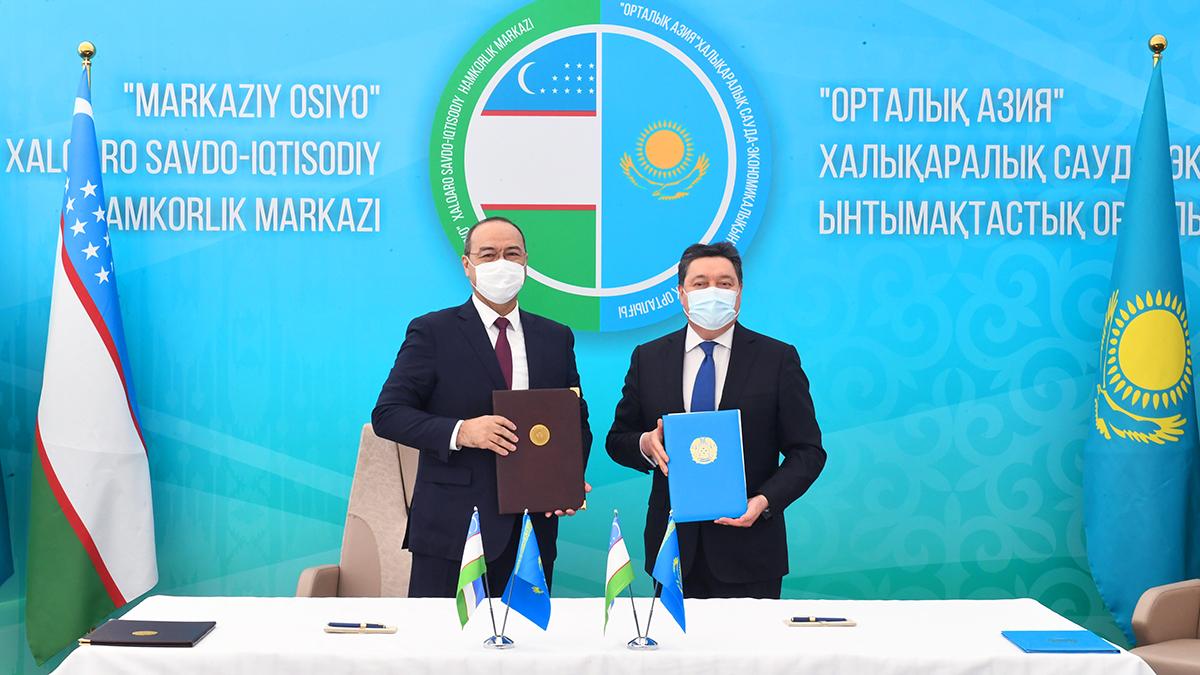Bakhyt Sultanov took part in the laying of a capsule at the construction site of the International Center for Trade and Economic Cooperation "Central Asia»

Today, on April 10, 2021, the Minister of Trade and Integration of the Republic of Kazakhstan took part in the solemn ceremony of laying a capsule at the construction site of the International Center for Trade and Economic Cooperation "Central Asia".
The bookmark was made by the Prime Minister of the Republic of Kazakhstan Mamin Askar Uzakbayevich and the Prime Minister of the Republic of Uzbekistan Aripov Abdulla Nigmatovich.
The initiative to create the ICEC "Central Asia" is aimed at building a fundamentally new system of interregional and cross-border trade relations that contribute to the joint development of the economic potentials of the two countries.
Bakhyt Sultanov said that the main focus should be on the development of industrial cooperation and the implementation of joint investment projects. The modernization of the transport infrastructure will be aimed at this.
The Minister of Trade and Integration also proposed to build a joint system of trade hubs, which should become the core of the development of Eurasian trade flows.
Kazakhstan is currently conducting systematic work on the development of the National Commodity Distribution System. The system includes 5 cross-border hubs and 24 orcs.
"Moreover, the Tashkent and Shymkent agglomerations, with a population of more than 9 million people within a radius of 500 km, make up 15% of the total population of Central Asia. There is a high level of economic complementarity, especially in agriculture and the food industry, " Sultanov Bakhyt said.
He noted that the Turkestan region has an important role for Uzbek exports to Russia, the EU and China. Tashkent region is an important transit point for Kazakhstan in the direction of Tajikistan, Afghanistan and Pakistan.
According to the head of the Ministry of Trade of Kazakhstan, the development of cross-border trade and logistics infrastructure will also contribute to the growth of transit trade with third countries from the current $23.0 billion in 2019 to $37.9 billion in 2030.
Also, the most promising areas of industrial cooperation are flour-milling, protein, furniture clusters, as well as the development of light industry.
"In order to create a unified commodity distribution system between our countries, we are also interested in creating 3 wholesale and distribution centers in Uzbekistan by attracting private investment from Kazakhstan," Bakhyt Sultanov said.
Currently, exports to Uzbekistan's GDP account for about 26% ($15.1 billion). In 2021, the goal is to increase exports by 20%.
6 of the 9 transport corridors of Uzbekistan for the delivery of goods for export pass through Kazakhstan. Thus, more than 50% of Uzbekistan's trade turnover passes through the territory of Kazakhstan.
The task between the states is to increase mutual trade to $10 billion. in the coming years.
In this regard, Bakhyt Sultanov proposed to speed up the construction of the "CA" MCTPP, which will be located in the area of the "Zhibek Zholy" and "Gisht Kuprik"PP. The total area of the Center will be 400 hectares.
According to him, it is supposed to be a round-the-clock (multi-sided, passenger, automobile) single digital checkpoint with cargo and passenger terminals. The capacity is 35 thousand people and 5 thousand trucks per day in both directions.
"At present, we are ready to start the implementation of the first stage of 30 hectares (both sides) of the ICPP for the construction of a single digital checkpoint, a CCS, a transport and logistics center, a bus station and access roads," the head of the Ministry of Transport and Logistics of Kazakhstan said.
As part of the 2nd stage, it is proposed to create an industrial trade and service zone. These are modern industrial facilities, joint cooperative enterprises, shopping centers and wholesale and retail centers, office and hotel facilities, and public catering facilities.
At the same time, we have great potential to create favorable conditions for expanding trade and economic cooperation and increasing mutual trade by using the resource potential of the two countries.
So, for example, there is a potential for creating cluster cooperative projects for the production of food products (flour-milling products, pasta, confectionery, fat-and-oil products, meat products), fruit and vegetable products, light industry goods (clothing, carpets and other floor coverings, bed linen and table linen), construction and chemical industry goods (polypropylene, household chemicals, building materials).
The volume of sales markets is estimated at more than $21 billion. with the geography of countries such as Afghanistan, Tajikistan, Turkmenistan, China, the EAEU countries and Central Asia.
For the successful functioning of these zones, it is important to simplify the procedures for passing the border for goods and individuals, as well as the transport and logistics system.
The creation of the ICEC will allow us to build a modern mechanism of trade not only between the countries, but also to make it an effective platform for regional trade in Central Asia .